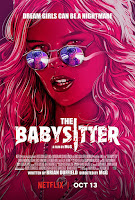Obvious Child
Obvious Child
(2014)
A Review by Grant Kanigan
Directed by: Gillian Robespierre
Written by: Gillian Robespierre, Karen Maine
& Elisabeth Holm
Starring: Jenny Slate, Jake Lacy,
David Cross, Richard Kind
Rating: PG
Release Date: June 20th, 2014
 |
| Jenny Slate & Jake Lacy in Obvious Child © 2014 - A24 |
Obvious Child follows Donna Stern, (Jenny Slate); a stand up comedian by night and book store clerk by day, Stern makes enough of a living to survive happily in a small Williamsburg apartment. She's got a good group of friends and a family base in New York, and some of her peers, like writer Sam, (David Cross, in an extended cameo), are hitting it big in the entertainment industry. Yet, her life is derailed when her long-time boyfriend cruelly ends their relationship in a dive bar bathroom. Stern drowns her sorrows, meets Max, (Jake Lacy) in the bar, and goes home with him. It's an enjoyable, if forgettable night until a few weeks later, when Stern realizes that her one night stand has resulted in a pregnancy. Shocked, disturbed and desperate, Stern comes to the conclusion that her best, and pretty much only option is an abortion. She isn't financially or emotionally ready to raise a child, especially when she doesn't even know who the father really is, besides a few drunken, goofy conversations from one lonely night.
This isn't Juno, or Knocked Up. Slate's Donna Stern has taken her time and made a decision, and while there are hilarious moments conversations within Obvious Child, it, like the best romantic comedies, (Annie Hall, When Harry Met Sally), also features some serious drama. She approaches her choice with tact, and isn't ashamed of her decision. This is where the movie takes an interesting turn. The term 'marginalization' defines certain members or groups within a society that are pushed aside, (into the 'margins'), because they don't fit into the narrow set definitions of the majority. In a patriarchal world where women are second class citizens, Stern fits into the role of the marginalized perfectly. However, her resistance to ask for help financially, her insistence on speaking unabashedly on-stage about her abortion and her will to not share her decision with Max pushes her struggles into the mainstream. Essentially, Stern's refusal to speak quietly about taboo subjects forces her marginalized status into central focus.
Jenny Slate, who first came onto my radar as a short-lived member of Saturday Night Live, (she was fired for this), finally hits her stride here. Best known for her absurdist internet sketches about a talking snail, (Marcel The Shell With His Shoes On), she never really fit the cookie cutter mold of sketch comedy, and honestly, SNL has become old hat. With gut-busting shows like Key & Peele and Inside Amy Schumer, comedy has moved on to bigger and better things. And so has Slate; not only is she hilarious in Obvious Child, she's also vulnerable, strong, independent and brilliant. The woman can act.
Overall, Obvious Child is about a woman just trying to have an ordinary courtship with an ordinary man in a world that has forced her into a life that's anything but. Robespierre's script is excellent but the true star here is Slate, who brings the film and script to life. While Obvious Child isn't perfect, (David Cross' character isn't necessary and it takes twenty minutes for the film to really get going), it's these eccentricities that add weight and laughter to the punchlines at the end of the movie. These unique qualities, and the important subject of the marginalization of women in North American society make Obvious Child a truly memorable film.
This isn't Juno, or Knocked Up. Slate's Donna Stern has taken her time and made a decision, and while there are hilarious moments conversations within Obvious Child, it, like the best romantic comedies, (Annie Hall, When Harry Met Sally), also features some serious drama. She approaches her choice with tact, and isn't ashamed of her decision. This is where the movie takes an interesting turn. The term 'marginalization' defines certain members or groups within a society that are pushed aside, (into the 'margins'), because they don't fit into the narrow set definitions of the majority. In a patriarchal world where women are second class citizens, Stern fits into the role of the marginalized perfectly. However, her resistance to ask for help financially, her insistence on speaking unabashedly on-stage about her abortion and her will to not share her decision with Max pushes her struggles into the mainstream. Essentially, Stern's refusal to speak quietly about taboo subjects forces her marginalized status into central focus.
Jenny Slate, who first came onto my radar as a short-lived member of Saturday Night Live, (she was fired for this), finally hits her stride here. Best known for her absurdist internet sketches about a talking snail, (Marcel The Shell With His Shoes On), she never really fit the cookie cutter mold of sketch comedy, and honestly, SNL has become old hat. With gut-busting shows like Key & Peele and Inside Amy Schumer, comedy has moved on to bigger and better things. And so has Slate; not only is she hilarious in Obvious Child, she's also vulnerable, strong, independent and brilliant. The woman can act.
Overall, Obvious Child is about a woman just trying to have an ordinary courtship with an ordinary man in a world that has forced her into a life that's anything but. Robespierre's script is excellent but the true star here is Slate, who brings the film and script to life. While Obvious Child isn't perfect, (David Cross' character isn't necessary and it takes twenty minutes for the film to really get going), it's these eccentricities that add weight and laughter to the punchlines at the end of the movie. These unique qualities, and the important subject of the marginalization of women in North American society make Obvious Child a truly memorable film.
Grant's Rating: 4.5/5 Stars
Jenny Slate in Obvious Child: "Tell Him" (NSFW)



Comments